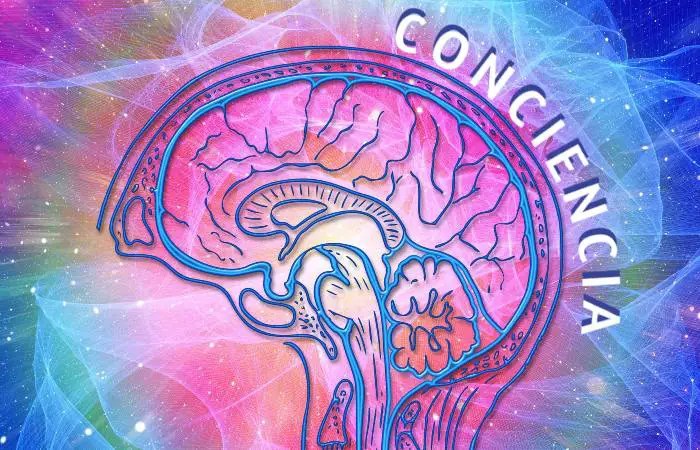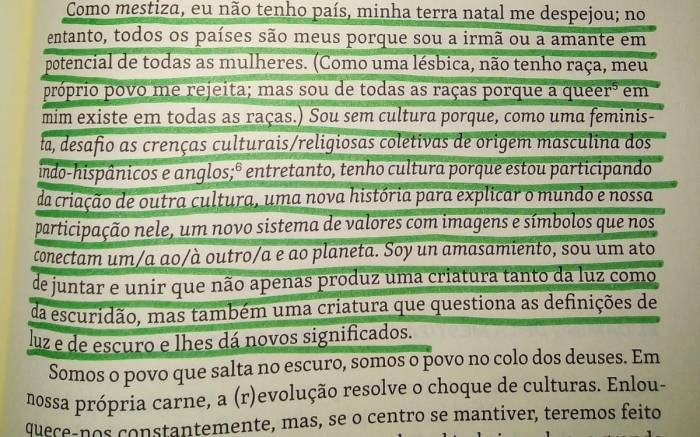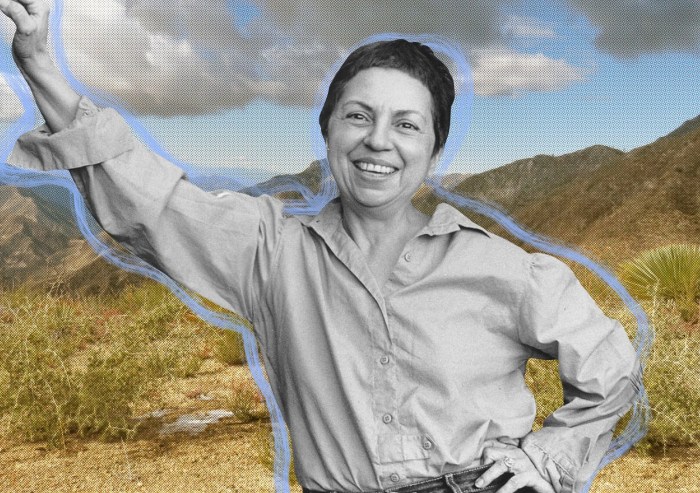As la conciencia de la mestiza takes center stage, this opening passage beckons readers into a world crafted with knowledge, ensuring a reading experience that is both absorbing and distinctly original.
La conciencia de la mestiza, a concept rooted in the experiences of mixed-race women, invites us to explore the complexities of identity, belonging, and empowerment. Through this lens, we delve into the historical and cultural context that has shaped mestiza consciousness, examining its diverse expressions and the challenges and opportunities it presents.
La Conciencia de la Mestiza: An Overview

La conciencia de la mestiza is a concept that refers to the consciousness and experiences of women who identify as mestiza. Mestiza is a term used to describe people of mixed racial heritage, particularly those of European and Indigenous American descent.
The concept of la conciencia de la mestiza was first developed by Chicana feminists in the 1970s as a way to understand the unique experiences of mestiza women in the United States.
La conciencia de la mestiza is significant because it provides a framework for understanding the experiences of mestiza women who have been marginalized and oppressed due to their race, gender, and class. It also provides a way for mestiza women to connect with their own history and culture and to develop a sense of identity and empowerment.
Historical and Cultural Context
The concept of la conciencia de la mestiza is rooted in the history of colonization and mestizaje in the Americas. Mestizaje is the process of racial mixing that occurred between European colonizers and Indigenous peoples. This process resulted in the creation of a new racial category, the mestizo, which was often seen as inferior to both European and Indigenous peoples.
Mestiza women have historically been marginalized and oppressed due to their race, gender, and class. They have been denied access to education, employment, and other opportunities. They have also been subjected to violence and discrimination.
Expressions of Mestiza Consciousness
La conciencia de la mestiza has been expressed in a variety of ways, including literature, art, and activism. Mestiza writers have explored the experiences of mestiza women in their work, and mestiza artists have created works of art that reflect the mestiza experience.
Mestiza activists have worked to improve the lives of mestiza women and to challenge the racism and sexism that they face.
La conciencia de la mestiza is a concept that explores the unique experiences and perspectives of individuals who identify with multiple cultural backgrounds. To further understand this concept, consider the cool in the 50s crossword , which offers a glimpse into the cultural landscape of the 1950s and how it shaped the identities of individuals.
By examining the crossword’s clues and answers, one can gain insights into the prevailing values, beliefs, and attitudes of the time, shedding light on the experiences of mestizas during that era.
Identity and Belonging

Mestiza consciousness, a framework developed by Gloria Anzaldúa, plays a pivotal role in shaping the identity and sense of belonging for mestizas, individuals of mixed racial and cultural heritage. This consciousness acknowledges the complexities and fluidity of mestiza identity, recognizing both the challenges and opportunities that come with it.Mestizas
often navigate a liminal space between different cultures, facing both acceptance and rejection from both sides. This can lead to feelings of isolation and a search for a sense of belonging. However, mestiza consciousness encourages mestizas to embrace their unique heritage, valuing the richness of their mixed ancestry.
Challenges
Mestizas may encounter challenges in terms of belonging due to societal stereotypes and prejudices. They may be perceived as outsiders by both dominant and marginalized communities, leading to feelings of alienation and exclusion. Additionally, the lack of representation in mainstream media and culture can further contribute to a sense of invisibility and a struggle for recognition.
Opportunities
Despite the challenges, mestiza consciousness also presents opportunities for growth and empowerment. By embracing their hybridity, mestizas can develop a strong sense of self-acceptance and pride in their unique identity. They can become bridges between different cultures, fostering understanding and promoting inclusivity.
Community and Solidarity
Mestiza consciousness fosters a sense of community and solidarity among mestizas. Recognizing their shared experiences and struggles, mestizas can come together to support and empower each other. This can lead to the formation of organizations, networks, and movements that advocate for the rights and visibility of mestizas.
Agency and Empowerment

Mestiza consciousness empowers mestizas by providing them with a framework for understanding their own experiences and identities. It helps them to recognize the ways in which they have been marginalized and oppressed, and it gives them the tools to challenge these injustices.
Mestiza consciousness also allows mestizas to connect with other mestizas and to build a sense of community and solidarity.
One of the most important ways in which mestiza consciousness empowers mestizas is by giving them a voice. For centuries, mestizas have been silenced and their experiences have been ignored. Mestiza consciousness gives them a platform to speak out and to share their stories.
This is essential for raising awareness of the challenges that mestizas face and for building a movement for change.
Mestiza consciousness also empowers mestizas by giving them a sense of agency. For too long, mestizas have been seen as passive victims of oppression. Mestiza consciousness helps them to recognize that they have the power to change their own lives and to make a difference in the world.
Challenging Dominant Narratives and Stereotypes
Mestiza consciousness plays a vital role in challenging dominant narratives and stereotypes about mestizas. These narratives and stereotypes have been used to justify the oppression of mestizas and to deny them their rights. Mestiza consciousness helps mestizas to deconstruct these narratives and stereotypes and to create new, more positive narratives about themselves.
For example, one of the most common stereotypes about mestizas is that they are “less than” white women. This stereotype is based on the idea that white women are pure and virtuous, while mestizas are mixed and therefore impure. Mestiza consciousness helps mestizas to challenge this stereotype by showing them that they are just as valuable and worthy as white women.
It also helps them to recognize that their mixed heritage is a source of strength, not weakness.
Promoting Social and Political Change, La conciencia de la mestiza
Mestiza consciousness can be used to promote social and political change in a number of ways. First, it can help to raise awareness of the challenges that mestizas face. This can lead to increased support for policies and programs that address these challenges.
Second, mestiza consciousness can help to build a movement for change. By connecting mestizas with each other and by giving them a voice, mestiza consciousness can help to create a powerful force for change.
Finally, mestiza consciousness can help to create new visions of a more just and equitable society. By challenging dominant narratives and stereotypes, mestiza consciousness can help to create a new understanding of what it means to be a mestiza. This new understanding can lead to the creation of new policies and programs that are designed to address the needs of mestizas and to promote their full participation in society.
Intersectionality and Social Justice: La Conciencia De La Mestiza

Mestiza consciousness is not solely defined by a single aspect of identity. Rather, it exists at the intersection of multiple forms of identity, such as race, class, and gender. This intersectionality allows mestiza consciousness to contribute to a more inclusive and just society.
Challenging Systems of Oppression and Discrimination
Mestiza consciousness acknowledges the complex ways in which systems of oppression and discrimination can intersect and impact individuals. By recognizing the interconnectedness of these systems, mestiza consciousness empowers individuals to challenge and dismantle them. It encourages empathy and solidarity among marginalized groups, fostering a collective struggle for justice.
Promoting Inclusivity and Representation
Mestiza consciousness promotes inclusivity and representation by embracing the diversity of experiences and perspectives within marginalized communities. It recognizes that no single narrative or identity can fully capture the complexities of mestiza identity. This inclusivity fosters a sense of belonging and empowers individuals to advocate for their rights and experiences.
Fostering Dialogue and Understanding
Mestiza consciousness encourages dialogue and understanding among diverse groups. By creating spaces for open and respectful conversations, it bridges divides and promotes empathy. This dialogue can lead to a deeper understanding of the challenges faced by marginalized communities and foster collaboration in addressing these issues.
Helpful Answers
What is the significance of la conciencia de la mestiza?
La conciencia de la mestiza provides a framework for understanding the unique experiences and perspectives of mixed-race women, shedding light on the complexities of identity, belonging, and empowerment.
How does mestiza consciousness empower individuals?
Mestiza consciousness empowers individuals by challenging dominant narratives, fostering a sense of community, and promoting social change. It enables individuals to embrace their multifaceted identities and work towards a more inclusive and just society.
What is the role of intersectionality in la conciencia de la mestiza?
Intersectionality plays a crucial role in la conciencia de la mestiza, recognizing that mestiza women’s experiences are shaped by multiple identities, such as race, class, and gender. This intersectional approach allows for a more nuanced understanding of the challenges and opportunities faced by mestizas.